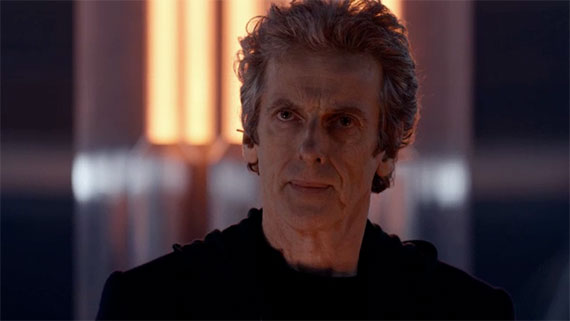12 Great Moments From Under the Lake
Mark McCullough picks out 12 faves from the 3rd episode of Series 9.
Note: Full episode spoilers follow, naturally!

To be honest with you, I wasn’t overly looking forward to Doctor Who on the weekend. Going on previous records, a story by Toby Whithouse, and a ghost story, neither are really my cup of tea. (Not that I’m much of a tea drinker). In the wake of the fantastic opening two part story, I feared that Under the Lake would finish up under the bar. Perhaps it was my low expectations, but the episode pleasantly surprised me and delivered a multitude of wonderful moments for consideration here. So here are my twelve highlights as Toby Whithouse brought back the traditional Doctor Who style story with great effect:
12. The Cliff-Hanger
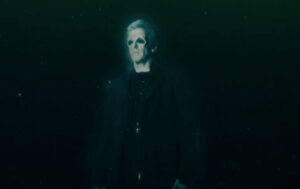
The biggest advantage of having the two part format back is that it allows for cliff-hangers between the episodes to keep the audience guessing until next week. Personally I find the best cliff-hangers are the ones that leave you asking: how do they get out of this? This episode delivers that, and then some with the revelation that the Doctor is travelling back in time to before the flood. However it is not without its problems otherwise it would not be the anchor of this list. Once again we have a main protagonist appearing to be dead at the close of the first episode of a story. Can’t think of the last time we had that! It’s not a fault of the story as per se, rather the placement in the series.
11. The Opening Scene
 Ghosts are hard to make interesting, to this viewer anyway. There’s something about them that is so bland and repetitive that I usually avoid the genre entirely. Which is why I feel the need to commend the episodes opening sequence on delivering a fresh take on a tired concept and dispelling any notion that this would be a Hide Mark II. What I like was how it avoided the typical tropes of what we as viewers associate with ghosts. It showed their presence early on and was able to develop its tension from their actions rather than the uncertainty of their existence.
Ghosts are hard to make interesting, to this viewer anyway. There’s something about them that is so bland and repetitive that I usually avoid the genre entirely. Which is why I feel the need to commend the episodes opening sequence on delivering a fresh take on a tired concept and dispelling any notion that this would be a Hide Mark II. What I like was how it avoided the typical tropes of what we as viewers associate with ghosts. It showed their presence early on and was able to develop its tension from their actions rather than the uncertainty of their existence.
10. The Ghost Spares Lunn
 Sticking with the concept of staying away from the tropes, I thought it was quite clever by Whithouse to have the ghost opt not to kill Lunn. The expectancy from the audience was that as soon as the ghost picked up the spanner, Lunn was gone in typical redshirt fashion. This illusion was also aided by the director (whose work was fantastic throughout it has to be said). The reason for sparing him was left ambiguous, however it has sown the seeds that the antagonists of the two-parter are capable of empathy and there are ways to survive them. Let’s see what comes to fruition next week.
Sticking with the concept of staying away from the tropes, I thought it was quite clever by Whithouse to have the ghost opt not to kill Lunn. The expectancy from the audience was that as soon as the ghost picked up the spanner, Lunn was gone in typical redshirt fashion. This illusion was also aided by the director (whose work was fantastic throughout it has to be said). The reason for sparing him was left ambiguous, however it has sown the seeds that the antagonists of the two-parter are capable of empathy and there are ways to survive them. Let’s see what comes to fruition next week.
9. Faraday Cage & Night vs Day
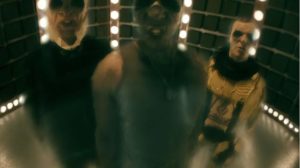 Some interesting concepts were added to the ghosts which helped develop them as a monster and give them unique character (something I would wager was lacking in the last attempt at a ghost story, Hide). Ghosts that only come out at night? Yes it plays to the tropes, but was necessary to move the narrative forward otherwise our characters would have spent the whole episode in the Faraday Cage. Speaking of which the suggestion of radio waves affecting the ghost gives them tangibility at least from a physics point of view, cool if you like nerdy stuff like that. Oh, and they can only touch things made of metal, sure why not? It’s unique. Although I’m not convinced the narrative actually stuck to that one.
Some interesting concepts were added to the ghosts which helped develop them as a monster and give them unique character (something I would wager was lacking in the last attempt at a ghost story, Hide). Ghosts that only come out at night? Yes it plays to the tropes, but was necessary to move the narrative forward otherwise our characters would have spent the whole episode in the Faraday Cage. Speaking of which the suggestion of radio waves affecting the ghost gives them tangibility at least from a physics point of view, cool if you like nerdy stuff like that. Oh, and they can only touch things made of metal, sure why not? It’s unique. Although I’m not convinced the narrative actually stuck to that one.
8. The Doctor gets Excited
 I know what you’re thinking here, and no I promise you I’m not scraping the barrel for moments because the episode was that dull! Genuinely there were other moments I wanted to include too, closest to inclusion but still missing out being the Doctor’s plan to trap a ghost. So why did I pick this one? To put it simply, it was great seeing the Doctor getting excited about something new. To a man with a wealth of knowledge and full experience of the universe, something new comes along and it has even the most serious of Doctors behaving like an excited child. A Doctor Who fan on a Saturday evening anyone?
I know what you’re thinking here, and no I promise you I’m not scraping the barrel for moments because the episode was that dull! Genuinely there were other moments I wanted to include too, closest to inclusion but still missing out being the Doctor’s plan to trap a ghost. So why did I pick this one? To put it simply, it was great seeing the Doctor getting excited about something new. To a man with a wealth of knowledge and full experience of the universe, something new comes along and it has even the most serious of Doctors behaving like an excited child. A Doctor Who fan on a Saturday evening anyone?
7. Quarantine
 Base under siege has become a regular set up for the revived series of Doctor Who, first utilised in The Impossible Planet/The Satan Pit, there has been almost one a series (or every other) since. Again a common feature of these types of story is a severance of the means of escape, which is usually established early on. This inverted slightly in this narrative as the means of escape is left open until midway through. This allows for an exciting scene where the ghosts try to escape, so the Doctor has to take it upon himself to close off the way to freedom and complete the base under siege atmosphere ramping up the tension to the max.
Base under siege has become a regular set up for the revived series of Doctor Who, first utilised in The Impossible Planet/The Satan Pit, there has been almost one a series (or every other) since. Again a common feature of these types of story is a severance of the means of escape, which is usually established early on. This inverted slightly in this narrative as the means of escape is left open until midway through. This allows for an exciting scene where the ghosts try to escape, so the Doctor has to take it upon himself to close off the way to freedom and complete the base under siege atmosphere ramping up the tension to the max.
6. The Crew Decide to Stay
 I found a lot of Under the Lake actually heralded back to material which we had seen in recent series, making subtle references. One such scene was when the Doctor persuaded the crew members to stay on the base and help him. As a viewer I couldn’t help but think about how the Doctor is capable of influencing someone’s life, and the power he holds over them at vulnerable time for them. It’s actually the only time I have been scared of what the Doctor is capable of. I feel this scene also benefits by position in the series, featuring after a Davros episode. With Davros’ words in my head throughout the scene, you have to wonder how many will die in the Doctor’s name next week?
I found a lot of Under the Lake actually heralded back to material which we had seen in recent series, making subtle references. One such scene was when the Doctor persuaded the crew members to stay on the base and help him. As a viewer I couldn’t help but think about how the Doctor is capable of influencing someone’s life, and the power he holds over them at vulnerable time for them. It’s actually the only time I have been scared of what the Doctor is capable of. I feel this scene also benefits by position in the series, featuring after a Davros episode. With Davros’ words in my head throughout the scene, you have to wonder how many will die in the Doctor’s name next week?
5. Rewriting our Synapses
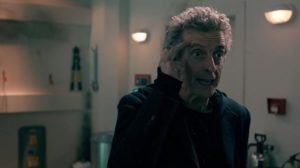 If there was ever a scene that screamed Meta it was this one, and a few others sprinkled throughout the episode. For me I got a real sense of awareness that Whithouse knew his audience, how they would be thinking, and what questions they would be asking next. Part of me wants to believe that the entire episode was structure around this with the exposure of the text that activates a certain style of thought right at the start. It was quite cheeky from Whithouse as it allowed him to drip feed us the answers before we were even asking the questions. Essentially this scene is Whithouse saying: the answers are all there, work them out. This is very smart writing which deserves commended.
If there was ever a scene that screamed Meta it was this one, and a few others sprinkled throughout the episode. For me I got a real sense of awareness that Whithouse knew his audience, how they would be thinking, and what questions they would be asking next. Part of me wants to believe that the entire episode was structure around this with the exposure of the text that activates a certain style of thought right at the start. It was quite cheeky from Whithouse as it allowed him to drip feed us the answers before we were even asking the questions. Essentially this scene is Whithouse saying: the answers are all there, work them out. This is very smart writing which deserves commended.
4. Pritchard is Killed
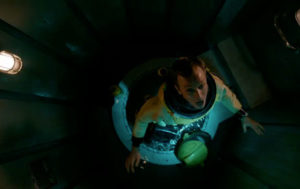
3. Cass in Command

2. Prompt Cards
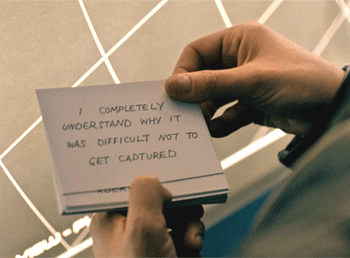
1. Duty of Care
Coming in at number one for this week is the scene the Doctor and Clara share in the TARDIS. Something isn’t right with Clara, that was evident in the opening two-parter, and it is highlighted again here with the revelation that the Doctor too thinks something is up. I have seen discussion that this might be grief for the loss of Danny, but I don’t think so. There’s something bigger at play with Clara in this writer’s opinion, but as of this stage I have no idea what it is. (You may get an article on this very topic at some stage in the not too distant future). Still regardless of the reason it is nice to see the Doctor care about someone other than himself, although it could be argued that Clara is developing into a reflection of him, so that might be why he cares.

